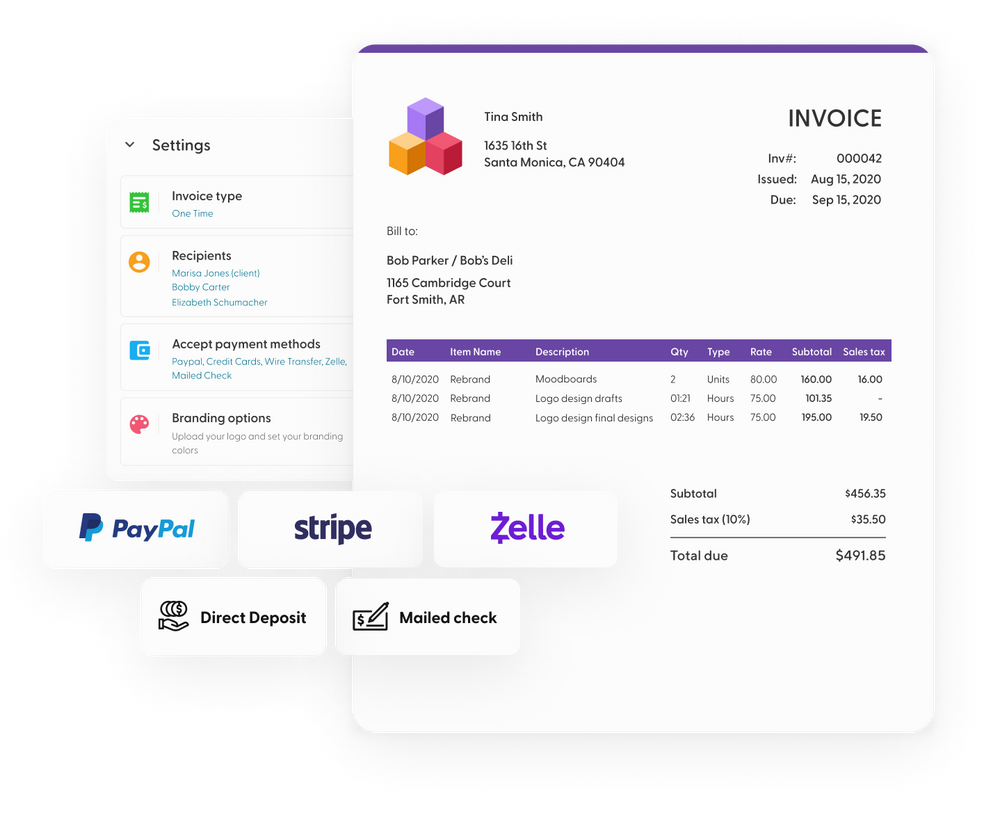While it may not be the first thing that comes to mind when trying to stay organized as a freelancer or business owner, invoicing on time is a key component of effectively managing your business and maintaining strong client relationships.
As humans, we often overthink the small things—like when to send an invoice. Should I wait a few days before sending it? Should I send it with the completed project? Are Tuesdays better than Wednesdays?
But it’s important to remember that you have the right to get paid for your work. It’s possible that your client has a methodology they prefer when it comes to billing. However, make sure you have this conversation early on so as to avoid headaches when the time comes to receive payment. Waiting too long to charge a client can potentially lead to misunderstandings, confusion, and a ding to your reputation. So how do we avoid this?
At What Point do You Send an Invoice?
You should send an invoice at the time specified by the payment terms in your contract. Invoice timing should be clear in your contract. If it's not, most people assume you will send an invoice immediately after the project or work is completed.
When Should You Send a Monthly Recurring Invoice?
Billing monthly is common for freelancers who use long-term contracts or retainer contracts. Invoicing customers on these terms should also clear in the contract. Send invoices on the date listed in the contract. If no date is listed, then you can consider the monthly anniversary as the date for sending invoices.
Can You Send an Invoice Before Work is Done?
Yes, if your contract allows you to do so. A long-term project should have a contract with regular invoices in the payment terms. If your contract doesn't have these payment terms, then you may want to contact your client to have their approval before sending an interim invoice. If they agree, you will get paid faster when you send an invoice.
Strategies for overcoming common doubts and questions about invoicing on time
Let’s go over some questions that freelancers deal with when invoicing, and how to navigate potential solutions.
Is one day better than another for sending all your invoices?
No. I remember once debating if I should be invoicing customers on a Friday or wait until Monday. My thought process was that it might be annoying for my client to receive an invoice right before her weekend. But this was a classic case of overthinking. When sending an invoice, the day is not important. What’s important is having communicated with your client what works for you both.
Should I wait for the client to bring it up?
No. Most clients aren’t going to rush into how and when they can pay you, but if they hired you, they are more than happy to pay you. That’s why you’re there. Bring it up earlier rather than later—this sets you off on a positive, transparent note.
Recommended language:
- “I generally invoice my clients the same day I deliver the project. This helps me better manage my bookkeeping. Does this work for you?” Using the word “generally” will give you a voice of authority – here, you communicate that you have a standard way of operating with clients but you leave the door open in case they have another way they’d rather pay.
Should I write new invoices for every project?
It depends. If you have a client who gives you repeated monthly work—a “subscription client”—it’s likely more convenient to send bimonthly invoices, like on the 1st and 15th of every month. This way, you charge for any projects delivered in the two weeks prior, and you and your client are constantly on track with the cyclic payments. Just be sure you include each item separately on the invoice so the client knows exactly what they are paying you for. On the other hand, if it’s not a subscription client, it’s best practice to invoice for each individual project.
3 Reasons Why an Invoicing System is Necessary for Your Small Business
Accounting policies might not be your thing, but you probably enjoy it when you get paid. So, to get you a little bit stoked about sorting out your accounting, here are three reasons why an invoice process will help you get paid.
Regular, Prompt Invoices Help Avoid Cash Flow Problems
Send your invoice on a regular schedule to receive payment and keep your bank balance in the black. If customers receive an invoice, they can pay the invoice. You have to plan your cash flow around the delay between when you send the invoice to your clients and when they make the payment. So, get your accounting together and send the invoice to your customers when you finish the job.
A Consistent Invoicing Process Limits Invoicing Mistakes
Add your company information to an invoice template to make fewer mistakes. Using a program like Indy's Invoices tool will help you lessen the number of invoicing mistakes you make. This will help you look more professional and avoid any hit to your cash flow because of returned invoices.
Use a System to Help Your Business Track Invoices and Get Paid
If you take the time to create an invoice system, then it will be easier to complete this task on time each time. Whatever method you choose, make it into a system to be sure you send the bill on time.
Quick Hitters: 3 of the Best Practices to Invoice a Customer
Have I convinced you to send invoices yet? I hope so. Let me give you three quick things to do to make your invoice life a little easier.
Use a Useful and Unique Invoice Number
In the US, you are not required to use any specific invoice number system. That doesn't mean you shouldn't. Numbering all your invoices sequentially will make keeping records easier. You could also number invoices by customer number, date, or some other useful information.
Offer Multiple Payment Options
Offering multiple ways for your customers to make payments is really simple and common. You should set up methods such as:
- Credit card payments
- Bank transfers
- Payment gateways like PayPal and Stripe
Offering these payment methods will make it as easy as possible for your customer to make a payment. In this case, easy equals fast.
Set Up a Payment Plan for Clients with a Regular Billing Cycle
If a customer pays for a product or service on a recurring basis, then you can set up a recurring invoice for them. Most invoicing products make this simple and give you the option to send the invoice automatically or review it before sending.
Bottom Line
When we think of project failure, it’s generally screwing up the content or missing a deadline that comes to mind. But don’t forget that you aren’t doing work for free, and invoicing on time is what will get you paid.
I’ve heard nightmare stories about freelancers who are fearful of approaching their client about invoicing because they’re uncomfortable with discussing money. This leads to worry about their financial situations because they aren’t getting paid as often as they should be.
Talking about money as a freelancer is normal. You’re operating a business, and it’s a part of your job. Engage early in the invoicing conversation with your clients. This will not only help you ensure financial stability, but it will also show your clientele that you’re a confident professional effectively running a valuable business.
Invoicing FAQ
When Should an Invoice be Issued?
Your contract should state when to send an invoice. If it doesn't then you can assume it is acceptable to bill your customer as soon as the work is finished. Recurring invoices should be sent on a specific day of the month, usually listed in your contract or on the anniversary of the work beginning.
What Day Should You Send Invoices?
There is not a 'best' day of the week. However, many companies send invoices at the middle and end of every month. So, if no other date is in the contract, send your customer an invoice on the 15th or 30th of each month.
What Must the Seller Do Before Sending an Invoice to a Customer?
The seller should have an agreement with the customer about the work and the payment amount. This agreement should be in your contract. If you don't have a contract, any written agreement, such as an email trail, can establish the agreement. Beyond this, all you need to do is deliver the product or services.
Do I Need to Issue an Invoice for My Business or Job?
Only if you want to get paid. Most freelancers have to issue invoices to receive payment. If you have a business model that allows for customer visits and contact, then you may not need an invoice because you will have contact with the customer. These seem rare, though.



